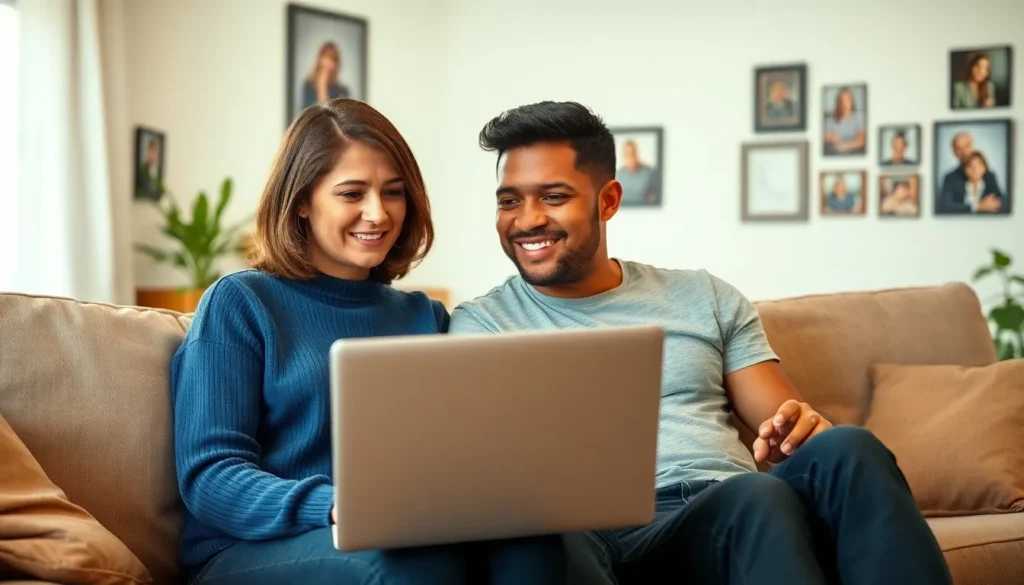In a world where swiping right can lead to swiping left, relationships can sometimes feel like a game of dodgeball. Enter online couples counseling—a lifeline for partners navigating the tricky terrain of love, communication, and the occasional sock left on the floor. With just a click, couples can access professional guidance from the comfort of their own couch, pajama pants optional.
Imagine addressing those nagging issues without the added stress of traffic or awkward waiting rooms. Online couples counseling offers a flexible and discreet way to tackle relationship challenges, all while sipping your favorite beverage. Whether it’s reconnecting over shared interests or learning to communicate without using interpretive dance, this modern approach might just be the secret sauce for lasting love.
Table of Contents
ToggleOverview of Online Couples Counseling
Online couples counseling offers a convenient way for partners to address their relationship concerns. Therapists provide sessions through video calls or messaging platforms, making it accessible from the comfort of home. Many couples appreciate this modern approach, as it eliminates the need for travel and waiting rooms.
Flexibility characterizes online counseling, allowing couples to schedule sessions around busy lives. Whether it’s a lunch break or an evening at home, partners can fit counseling into their routines. Discretion also plays a role, as clients often prefer the privacy of remote sessions over traditional in-person visits.
Effectiveness remains vital in counseling, regardless of the medium. Numerous studies indicate that online therapy can be as beneficial as face-to-face interactions. Providing a safe environment fosters open communication, helping couples develop skills to enhance their relationships.
Various platforms offer diverse resources, such as guided exercises and educational materials. Couples can engage in exercises tailored to their specific challenges, enhancing understanding and collaboration. Therapists may assign tasks for couples to practice between sessions, reinforcing learned techniques.
Affordability becomes a significant factor when considering counseling options. Online counseling typically presents lower costs compared to traditional therapy. Some platforms even offer subscription models, making sessions accessible for a broader range of couples.
Accessibility to professional help remains crucial in today’s fast-paced world. Couples can connect with licensed therapists specializing in relationship issues, ensuring they receive appropriate guidance. By choosing online counseling, couples take a proactive step towards improving their relationship dynamics.
Benefits of Online Couples Counseling

Online couples counseling offers several key advantages that enhance relationship support. Couples gain access to professional help from the comfort of their homes, which reduces barriers related to travel and logistics.
Accessibility and Convenience
Remote sessions provide flexibility in scheduling appointments around busy lives. Couples can choose time slots that work best for them, making it easier to commit to counseling. Access to therapists via video calls or messaging platforms further increases convenience. Individuals can participate in therapy without experiencing the discomfort of waiting rooms. Privacy remains intact, enabling open discussions about sensitive issues. Couples also benefit from various platforms that offer different resources tailored to their unique needs.
Cost-Effectiveness
Online counseling typically costs less than traditional therapy options. Many couples find that reduced overhead for therapists translates to savings. Affordable subscription plans and payment structures enhance accessibility for many households. Cost-effectiveness encourages couples to seek help sooner, preventing issues from escalating. Additionally, the ability to access a wider range of therapists can lead to finding a provider that fits their budget and needs. Investing in online counseling often yields significant returns in relationship satisfaction and stability.
Types of Online Couples Counseling
Couples can choose from various online counseling formats, each catering to different preferences and needs. Here are two common types of online couples counseling.
Video Sessions
Video sessions allow couples to interact face-to-face in a virtual setting. Therapists use platforms like Zoom or Skype for real-time communication. Couples appreciate the visual element as it fosters connection and empathy. Real-time feedback and discussions occur in a secure environment, promoting open dialogue about sensitive issues. Scheduling these sessions typically aligns with partners’ availability, making participation easier. Many couples find that seeing their therapist enhances engagement and accountability.
Chat-Based Counseling
Chat-based counseling offers an alternative for couples who prefer written communication. This format takes place through messaging platforms, allowing partners to share thoughts and feelings without the pressure of real-time interaction. Many appreciate the time to reflect and articulate their emotions clearly. It suits those with busy schedules or those who may feel anxious during live sessions. This format can also provide ongoing support through asynchronous conversations, adding convenience and flexibility to the counseling experience.
Choosing the Right Online Couples Counselor
Selecting the right online couples counselor significantly impacts the effectiveness of therapy. Consider the therapist’s qualifications, including degrees and certifications in marriage and family therapy. Researching their experience in managing specific issues helps ensure compatibility with a couple’s unique challenges.
Reviewing online profiles provides insight into each counselor’s approach and specialties. Preferences might include therapists who focus on communication issues, conflict resolution, or intimacy concerns. Many platforms offer ratings and reviews from previous clients, aiding in the decision-making process.
Exploring session formats factors into choosing the right fit. Video sessions often promote deeper connections through visual cues, while chat-based options might cater to couples who prefer asynchronous communication. Assessing personal comfort with technology also plays a crucial role; stable internet access and familiarity with video conferencing can enhance the experience.
Cost considerations also guide the choice of a counselor. Couples can compare pricing structures of various platforms, looking for options that align with their budget. Some services provide subscription plans, making therapy affordable and accessible.
Prioritizing communication styles is essential for successful outcomes. Noting how a counselor articulates concepts or responds to questions can indicate whether their style resonates with clients. Scheduling flexibility also matters, as therapists who offer varied appointment times ease the burden of fitting counseling into busy lives.
Lastly, trust the gut feeling when choosing. Those initial impressions of comfort and connection often signal the right match. Exploring multiple counselors before making a final decision ensures couples find the support best suited to their needs.
Challenges of Online Couples Counseling
Online couples counseling faces several challenges that can affect the therapy experience. Technology issues often disrupt sessions, including connectivity problems or software malfunctions. Those interruptions can hinder communication and lead to frustration.
Maintaining a personal connection via a screen proves difficult for some couples. Non-verbal cues, such as body language and facial expressions, may not translate effectively in virtual settings. This limitation can reduce the emotional intimacy essential for therapy.
Another challenge lies in the lack of physical presence. Couples may feel more comfortable discussing sensitive topics in person. The absence of a traditional office environment can lead to a less secure atmosphere.
Overcoming distractions during remote sessions represents an additional hurdle. Home environments might contain interruptions from family members, pets, or household tasks. Such distractions can limit focus, making it harder to engage fully in the counseling process.
Establishing trust with an online counselor can take time. Couples might question the effectiveness of therapy without the in-person interaction they expect. Ensuring that the therapist meets their needs and style requires ongoing communication.
Differences in technology proficiency among partners may pose issues. One partner may be comfortable with digital platforms while the other struggles to navigate them. This discrepancy can create frustration and lead to unequal participation in sessions.
Finally, limited access to emergency support stands out as a significant concern. In crisis situations, immediate in-person help may not be readily available. Couples should prioritize having a plan for emergencies while participating in online therapy.
Online couples counseling offers a valuable resource for partners seeking to strengthen their relationship. By providing accessible and flexible options, it allows couples to address issues in a comfortable environment. The effectiveness of this approach is backed by research, and the cost savings make it an attractive choice for many households.
While challenges exist, such as technology issues and maintaining emotional intimacy, the benefits often outweigh the drawbacks. Couples can enhance their communication and understanding through tailored resources and guided exercises. By choosing the right counselor and being mindful of potential obstacles, partners can navigate their relationship challenges more effectively. Embracing online counseling could be the first step toward a healthier, more fulfilling partnership.



